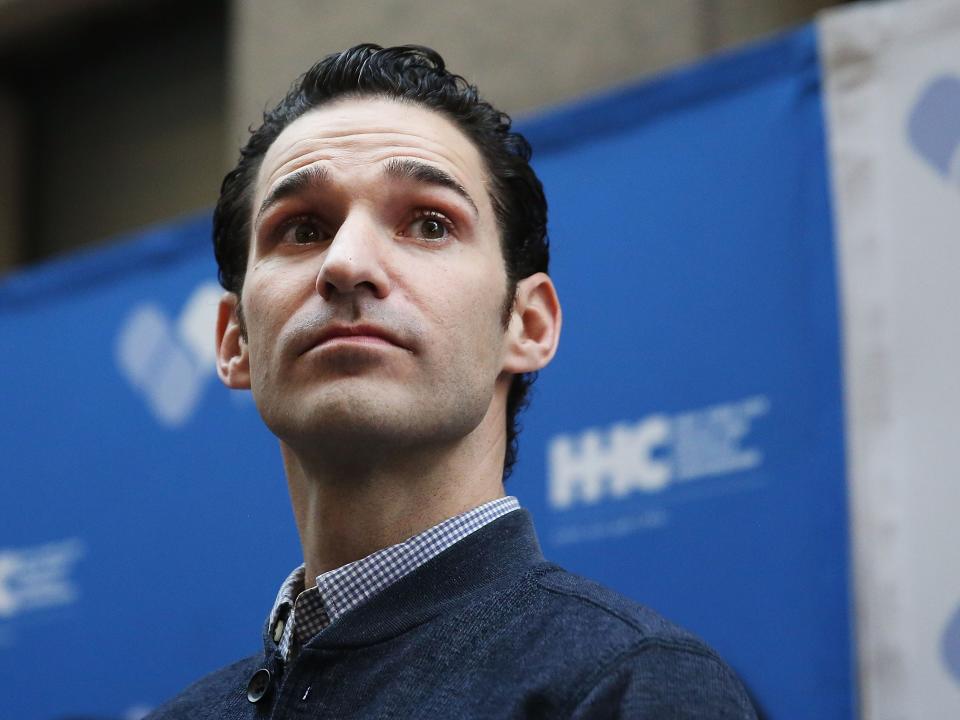An ER doctor who survived Ebola shares the harrowing reality of the coronavirus pandemic and levels a stark warning

On Twitter, Dr. Craig Spencer shared what a day in the life of an emergency room doctor is like amid the coronavirus pandemic.
His day starts around 6:30 a.m. brewing coffee — enough for the whole day — and ends with him stripping down in the hallway before taking a shower and reuniting with his family.
"I survived Ebola. I fear #COVIDー19."
Dr. Craig Spencer starts his day ordinarily enough.
At 6:30 a.m., he brews coffee, enough to last him the whole day.
From there, he heads to work, where he's on the frontlines of the city's fight against the coronavirus pandemic.

Spencer Platt/Getty Images
Spencer's an emergency-room doctor and the director of global health in Emergency Medicine at New York-Presbyterian/Columbia University Medical Center.
His shift in the emergency room begins at 8 a.m., he said in a Twitter thread. And the coffee needs to last him all day because the shops near the hospital are all closed.
Spencer has a unique perspective on the coronavirus pandemic.
After caring for patients with Ebola in Guinea in West Africa, he became New York City's first and only Ebola patient in 2014.
Spencer warns that people should take this disease just as seriously.
On Twitter, he shared what his day was like on Monday, March 23 in the emergency room. As of this Monday, there were 12,305 coronavirus cases in New York City. Overall, the state accounts for nearly 6% of worldwide cases, making it a center of the pandemic.
Never miss out on healthcare news. Subscribe to Dispensed, our weekly newsletter on pharma, biotech, and healthcare.
While the streets outside in the early morning are pretty quiet, inside is a different story.
"There is a cacophony of coughing. You stop. Mask up. Walk in," he tweeted.
Nearly every patient is experiencing the same symptoms, regardless of age, he wrote: "Cough, shortness of breath, fever."
Before 10 a.m. two patients he's seeing need to go on ventilators to help them breath. The day carries a similar rhythm based on the symptoms.
At some point, he tweeted, he realizes he hasn't drank water. At the same time, he doesn't want to remove his mask. He recalls his experience treating Ebola in West Africa in which he went hours without drinking water. "Surely you can last a little longer," he tweeted.
Read more: A week in the life of a doctor in an NYC hospital who is battling the coronavirus on the front lines
Lunch break comes in the late afternoon in the hospital's cafeteria. After washing hands twice and taking off his mask, he eats quickly, he wrote.
Spencer wears his protective gear all day, he wrote.
"Nearly everyone you see today is the same. We assume everyone is #COVIDー19. We wear gowns, goggles, and masks at every encounter. All day. It's the only way to be safe," he wrote.
"Where did all the heart attacks and appendicitis patients go? Its all COVID."
While transitioning to the next team of workers, the chatter is about friends who don't have enough protective gear and hospitals that are running out of ventilators.
Before leaving the hospital, Spencer wrote, he wipes everything down before leaving: mug, badge, wallet, etc.
Outside, he notes a stark contrast to what is happening within the busy walls of the hospital.
"The streets are empty. This feels nothing like what is happening inside. Maybe people don't know???" he tweeted.
At home, Spencer strips out of clothes in the hallway and immediately goes to shower.
"Your wife tries to keep your toddler away, but she hasn't seen you in days, so it's really hard," he tweeted.
The difference between the outside world and inside the hospital, he noted, will make it hard for people to understand how severely the pandemic is hitting hospitals.
"You reflect on the fact that it's really hard to understand how bad this is - and how bad its going to be - if all you see are empty streets," he tweeted. "Hospitals are nearing capacity. We are running out of ventilators. Ambulance sirens don't stop."
Spencer ended his thread by telling the public to help in slowing the virus.
"We were too late to stop this virus. Full stop. But we can slow it's spread. The virus can't infect those it never meets. Stay inside," he tweeted. "Social distancing is the only thing that will save us now. I don't care as much about the economic impact as I do about our ability to save lives."
Drawing from his experience surviving Ebola, he finished by explaining the stakes of getting the novel coronavirus.
"You might hear people saying it isn't real. It is. You might hear people saying it isn't bad. It is. You might hear people saying it can't take you down. It can," he wrote.
"I survived Ebola. I fear #COVIDー19."
You can read the entire Twitter thread here.
Do you work at a hospital in New York? Business Insider would like to hear what you're seeing on the front lines of the coronavirus response. Email the author at [email protected].